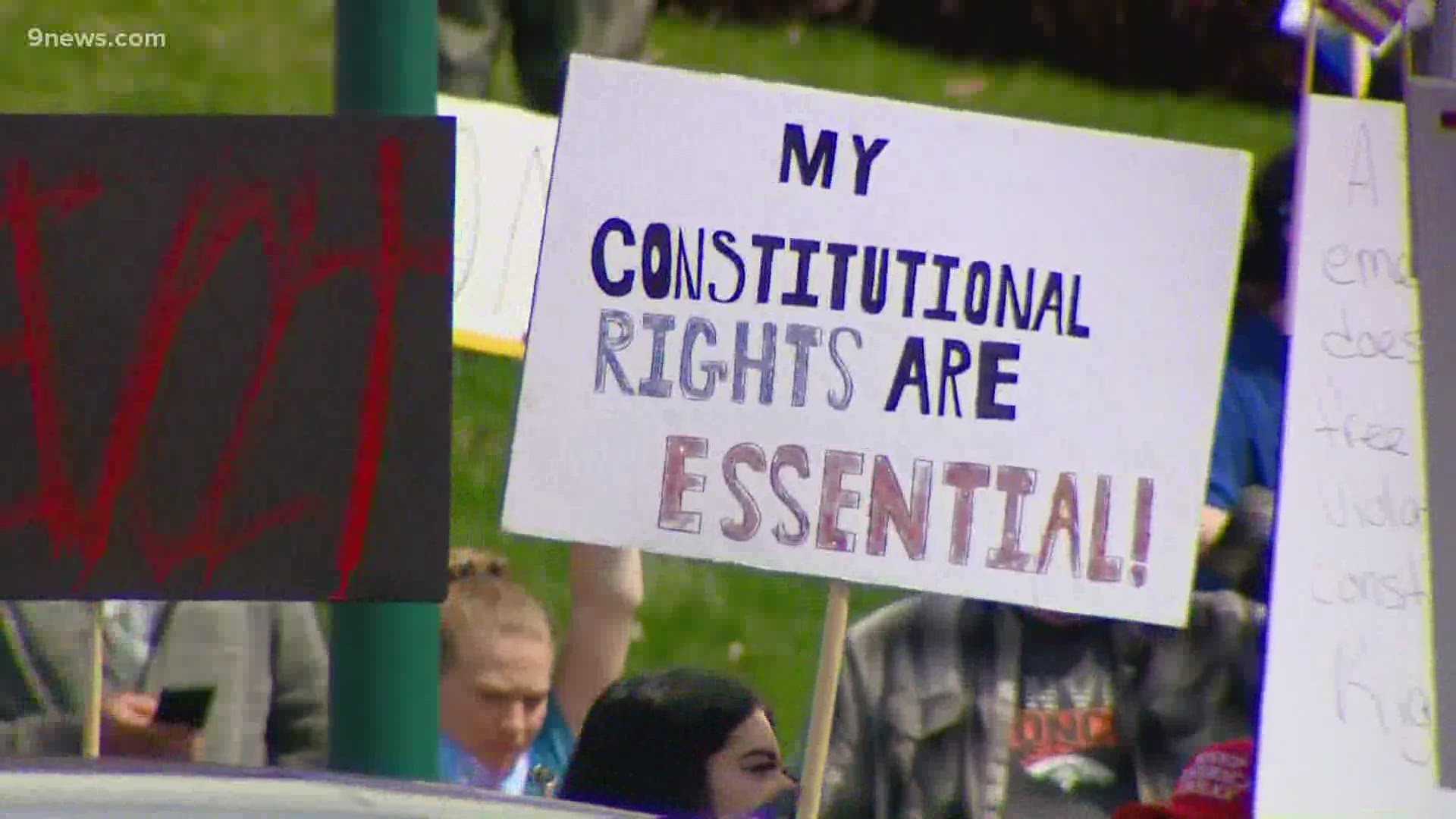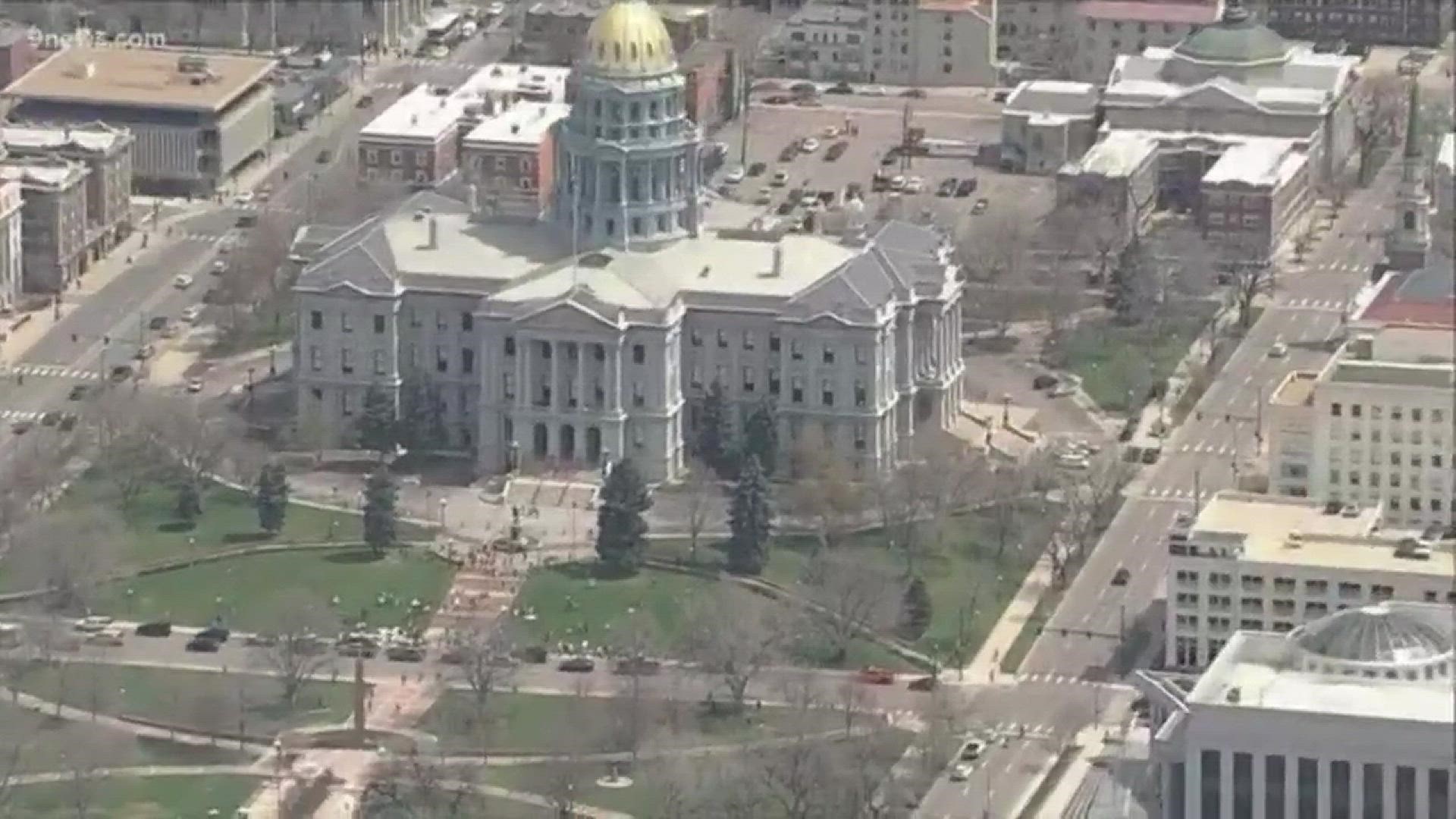DENVER — Multiple groups organized protests on Sunday afternoon against Colorado's stay-at-home order, which Gov. Jared Polis issued due to the COVID-19 pandemic.
The Colorado Joint Information Center (JIC) acknowledged that people are frustrated, but reminded the public that the stay-at-home order is meant to protect the safety of the entire community, ahead of protests that took place at the Colorado State Capitol in downtown Denver.
The JIC issued a statement before the protests reminding the public it's illegal to willfully block a public right-of-way:
"We understand people are frustrated with our current situation, but the stay-at-home order protects the health, safety and welfare of our entire community," JIC said." Operation Gridlock would be a wholly irresponsible and reckless way to express those frustrations."
"The city must enforce the stay-at-home order to protect the public during the COVID-19 pandemic, which we know the vast majority of our community understands," said Erika Martinez with Denver Joint Information. "Enforcement is a last resort, but is necessary if we, as a community, are going to stop the spread of the virus."
Colorado State Patrol (CSP) said that no permits were filed for Sunday's protests.
A spokesperson for Polis released the following statement when asked about the protests:
“Coloradans have a first amendment right to protest and to free speech, and the governor hopes that they are using social distancing and staying safe. No one wants to reopen Colorado businesses and lift these restrictions more than the Governor, but in order to do that, Coloradans have to stay home as much as possible during this critical period, wear masks and wash their hands regularly to slow the spread of this deadly virus.”
At least two groups, ReOpen Colorado and the Colorado Libertarian Party, organized the protests. A third group also protested.
Steve Peck with ReOpen Colorado said the group's Facebook page was created on April 13, and had gained more than 12,000 followers by April 18.
Peck said ReOpen Colorado asked group members to be respectful, wear masks and properly social distance if they exited their cars.
The Denver Police Department said the protesting was winding down at 4:30 p.m. on Sunday.
RELATED: 'We are doing everything we can': Lack of widespread testing will affect how fast Colorado reopens
Polis and state health officials have made it clear that without testing infrastructure and actual COVID-19 tests, the state “won’t be able to implement our testing strategy, which is one of those foundational elements of reopening.”
Colorado’s COVID-19 Incident Commander, Scott Bookman, said on April 16 that the Colorado Department of Public Health and Environment’s (CDPHE) goal is to have a testing site in every county.
CDPHE is working with county health departments and other healthcare partners to make that happen, but the state still lacks COVID-19 tests.
“We are doing everything we can, working with our federal partners," Bookman said. "And the private sector within the state within the country and internationally to gain all of the equipment and consumables we will need to do mass testing across the state. That is really a key pillar to our ability to move into our new normal."
CDPHE did not respond to a request Thursday afternoon regarding the amount of tests needed or when they might be coming. However, 9Health Expert Dr. Payal Kohli said the state will need to consider more than just the amount of tests it gets.
She said tests that provide results in minutes or hours, not days, will play an important part in isolating sick people and preventing spread. Also, Colorado will need serology tests to determine if people have been carrying the virus asymptomatically. Plasma transfusions may help the critically ill recover.
“Since we're testing only a very small piece of the pie, we really don't know what the entire pie looks," Kohli said. "And therefore, we really can't relax our social distancing measures."
While most COVID-19 patients recover, the outbreak has killed at least 163,000 people worldwide, according to a Johns Hopkins University tally on April 19 based on figures supplied by government health authorities around the globe.
The protests in Colorado on Sunday mirrored many other similar events opposing stay-at-home orders that have been planned in several cities in recent days.
The COVID-19 pandemic and resulting stay-at-home orders have had a negative impact on the economy.
The Associated Press (AP) reports that roughly 22 million have sought jobless benefits in the past month, the worst stretch of U.S. job losses on record.
Nearly 12 million people are now receiving unemployment checks, roughly matching the peak reached in January 2010 shortly after the Great Recession officially ended, according to the AP.
Some economists tell the AP that the unemployment rate could reach as high as 20% in April, which would be the highest rate since the Great Depression of the 1930s. By comparison, unemployment never topped 10% during the Great Recession.
Over the past four weeks, 231,610 people have filed for unemployment in the state, according to the Colorado Department of Labor and Employment (CDLE).
CDLE reported that number is greater than the total number of unemployment claims filed per year between 2011 and 2019.
CDLE acknowledged it will likely only grow in the coming weeks as it hones its framework to allow gig workers and independent contractors to receive unemployment benefits.
Colorado paid out $62 million in unemployment benefits the week of April 11. It paid $29.8 million the week before. Both of these numbers greatly exceed the $8.7 million average paid out per week earlier in 2020, and the $19 million in benefits paid out during the 2009-10 Great Recession.
Like last week, the top five industries with the highest numbers of employment claims were:
- Accommodation and food services with 21,124 claims approved so far
- Healthcare and social service with 9,717 claims approved so far
- Retail trade with 7,400 claims paid so far
- Other services with 5,914 claims paid so far
- Arts, entertainment and recreation with 4,080 claims paid so far
The Associated Press contributed information to this report.
SUGGESTED VIDEOS: COVID-19 Coronavirus


